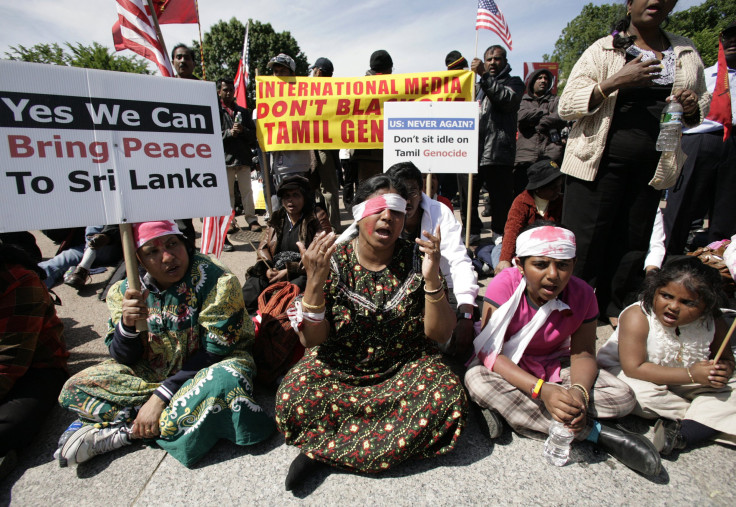Sri Lanka War Crimes Report: 'Reasonable Grounds' To Believe Both Sides Indulged In 'Horrific' Abuses, UN Says

A long-awaited report on alleged war crimes committed during Sri Lanka’s protracted and bloody civil war was released Wednesday. In the report, the U.N. Human Rights Office said that both sides in the conflict -- the Tamil separatist group LTTE and Sri Lankan government forces -- “most likely” committed war crimes.
“There are reasonable grounds to believe the Sri Lankan security forces and paramilitary groups associated with them were implicated in unlawful killings carried out in a widespread manner against civilians and other protected persons,” the U.N. agency said, in its report. “[The investigation] also gathered information that gives reasonable grounds to believe that the LTTE also unlawfully killed Tamil, Muslim and Sinhalese civilians perceived to hold sympathies contrary to the LTTE.”
The nearly three-decade long civil war in the island nation pitted the majority Sinhalese population against the LTTE, a separatist group demanding a homeland for the minority Tamils in the country's north. Up to 100,000 people, including a huge number of civilians, are believed to have died in the conflict. The war ended after the Sri Lankan military killed LTTE leader Velupillai Prabhakaran in 2009.
Human rights group have, in the past, accused both sides of indulging in widespread human rights violations, including torture and sexual abuse. In the report, the U.N. agency described centers equipped with metal bars for beating prisoners, barrels of water for waterboarding and pulleys for suspending victims.
“Our investigation has laid bare the horrific level of violations and abuses that occurred in Sri Lanka, including extrajudicial killings, enforced disappearances, harrowing accounts of torture and sexual violence, recruitment of children and other grave crimes,” the U.N. High Commissioner for Human Rights Zeid Ra’ad Al-Hussein reportedly said, in a statement accompanying the report.
The investigation also revealed that rape and other forms of sexual violence by Sri Lankan security forces against both male and female detainees were “widespread,” particularly in the aftermath of the armed conflict.
“The patterns of sexual violence appear to have been a deliberate means of torture to extract information and to humiliate and punish persons who were presumed to have some link to the LTTE,” the U.N. agency said, in its report.
The U.N. said last year that it would launch an investigation into allegations of war crimes, but Sri Lanka’s former President Mahinda Rajapaksa -- who was defeated by his one-time ally Maithripala Sirisena in January -- refused to cooperate. However, the new government has promised to support the U.N. in its inquiry, a decision Zeid said offered “ground for hope.”
The U.N. agency urged Colombo to create a special “hybrid” court -- involving Sri Lankan and international jurists, prosecutors and investigators -- to look into atrocities committed during the civil war, and to remove security personnel and public officials suspected of involvement in human rights violations.
“The new government’s commitments ... are welcome, but it needs to convince a very sceptical audience -- Sri Lankan and international -- that it is determined to show results,” the report said. “Prosecuting a few emblematic cases will not be sufficient; Sri Lanka needs to address the patterns of serious human rights violations and other international crimes that have caused such suffering for all communities over decades if it is to prevent them haunting its future.”
#SriLanka: Copy of new UN report on #humanrights violations committed btw 2002-11 now available here http://t.co/MJ3nXeOwEN
— UN Human Rights (@UNrightswire) September 16, 2015However, in a statement cited by Reuters, Sri Lanka’s foreign ministry refrained from addressing the proposal to set up a special court, instead promising to “ensure dialogue and wide consultations” with all stakeholders.
“[The report’s recommendations] will receive due attention of the relevant authorities, including the new mechanisms that are envisaged to be set up,” the foreign ministry reportedly said.
© Copyright IBTimes 2024. All rights reserved.






















